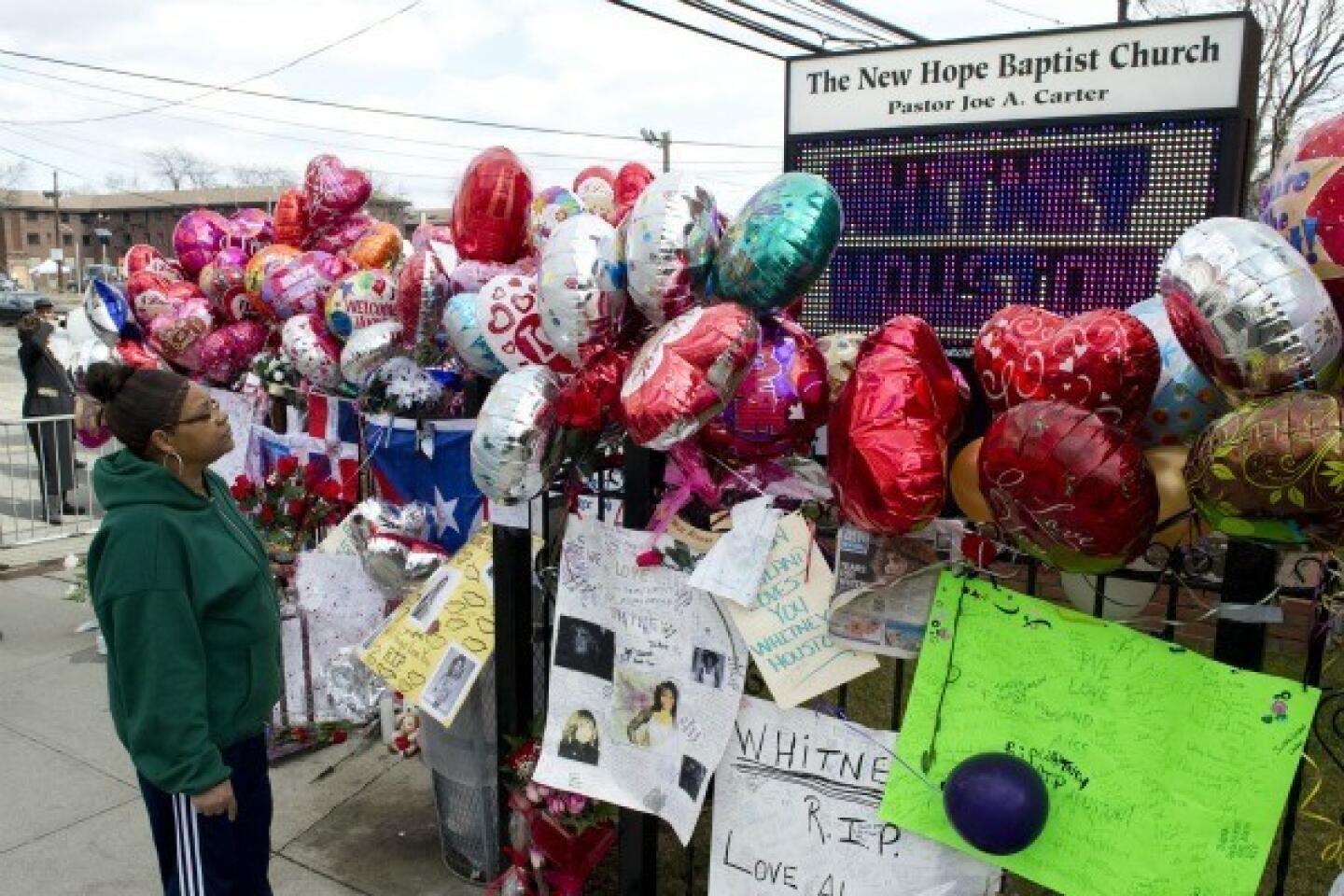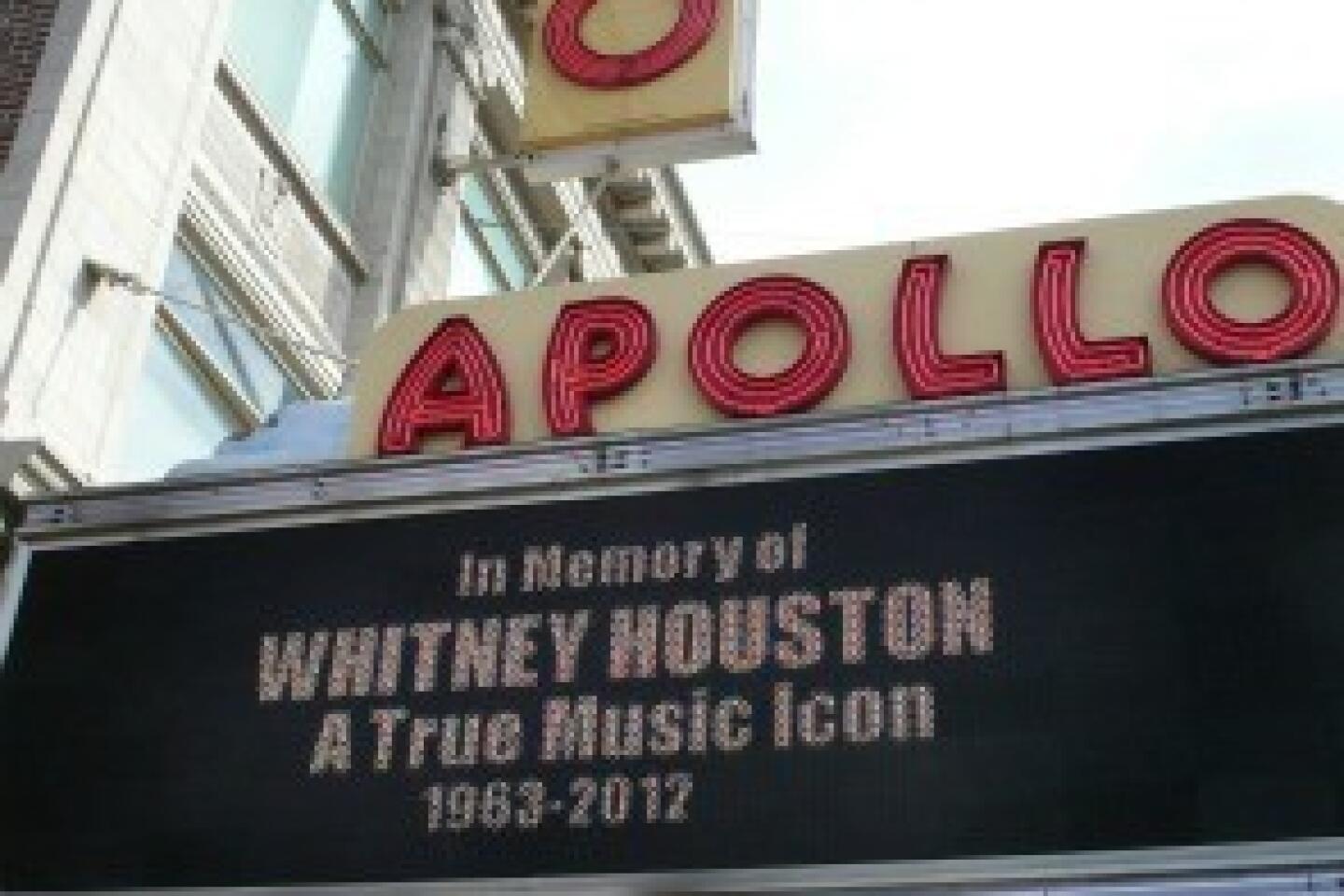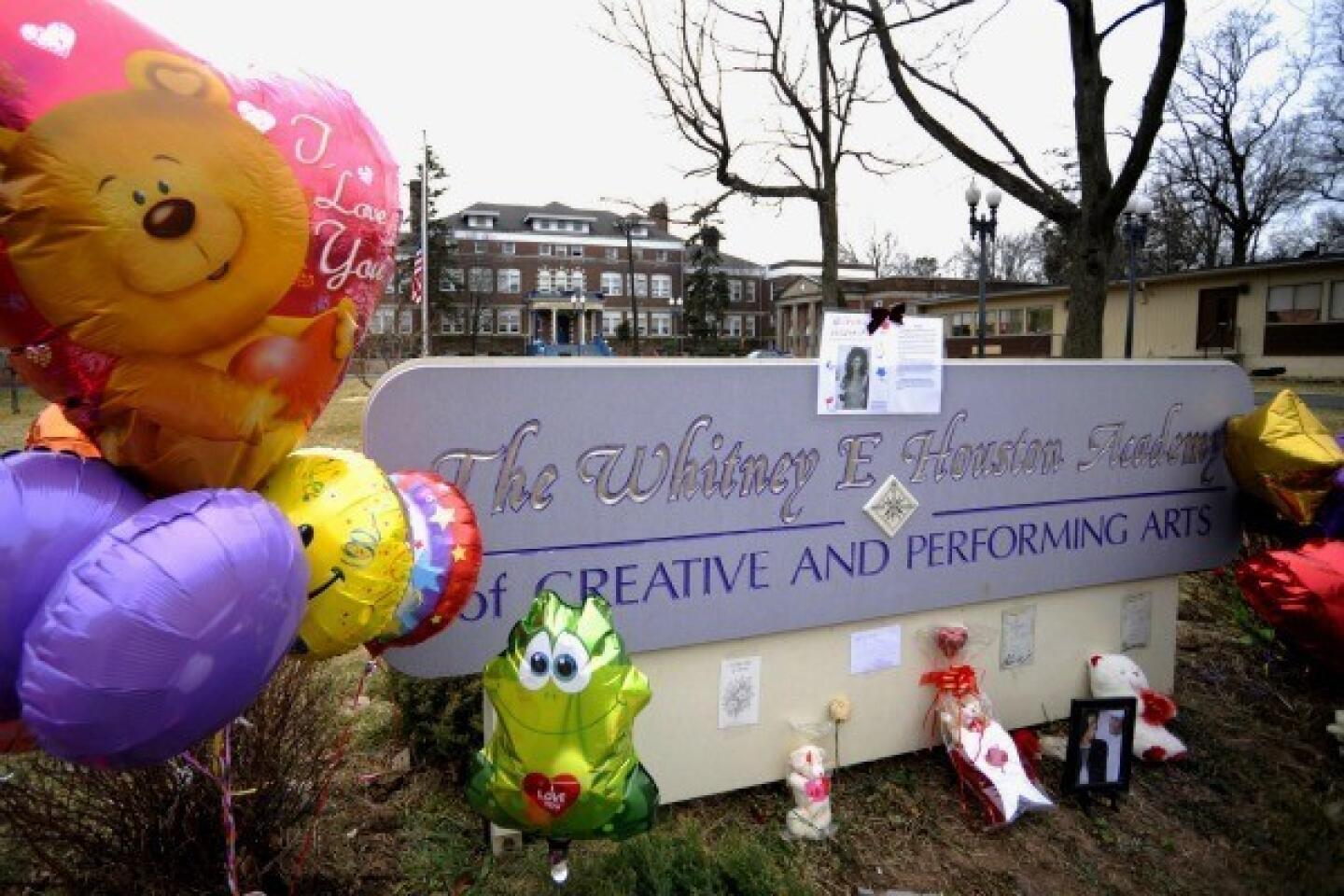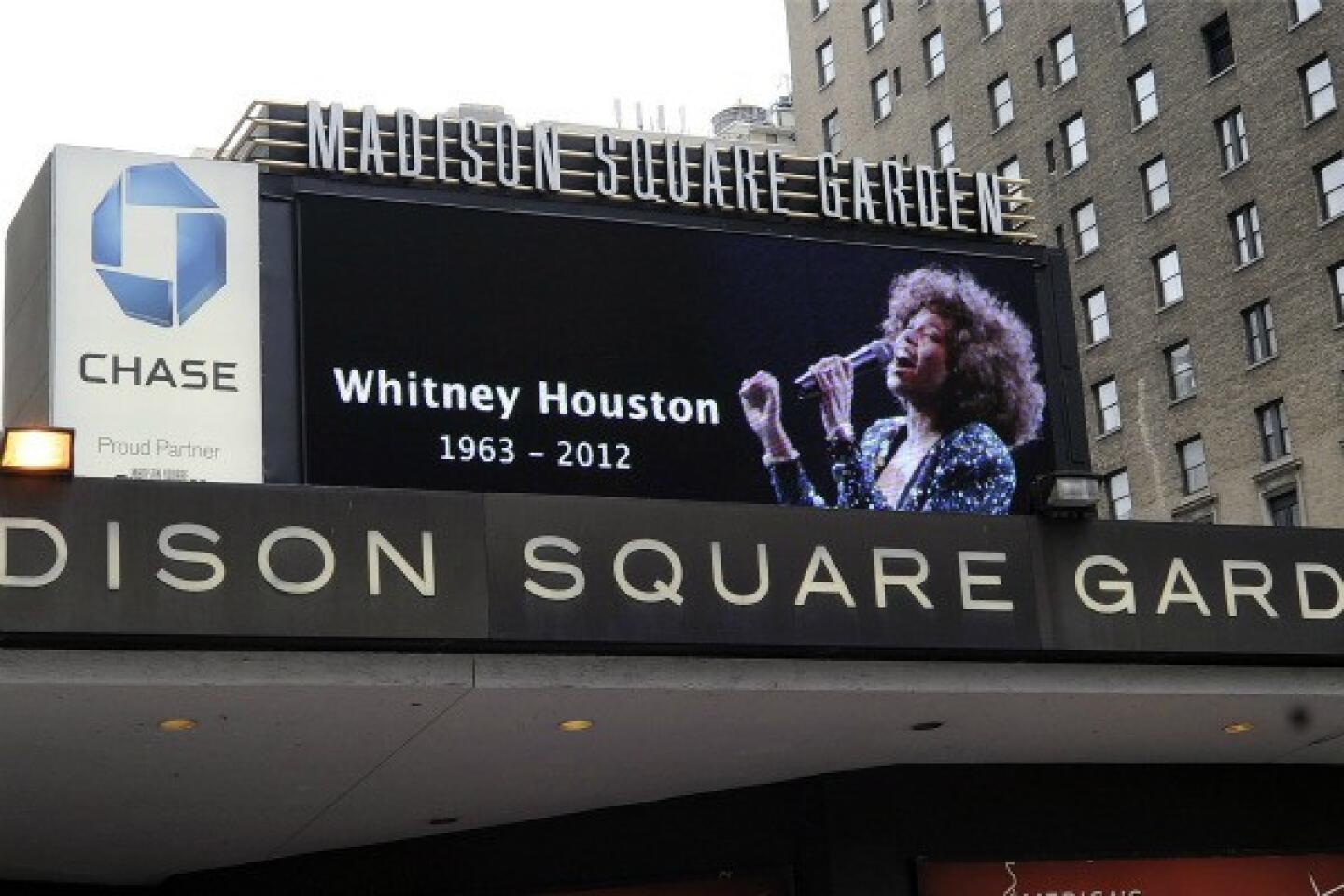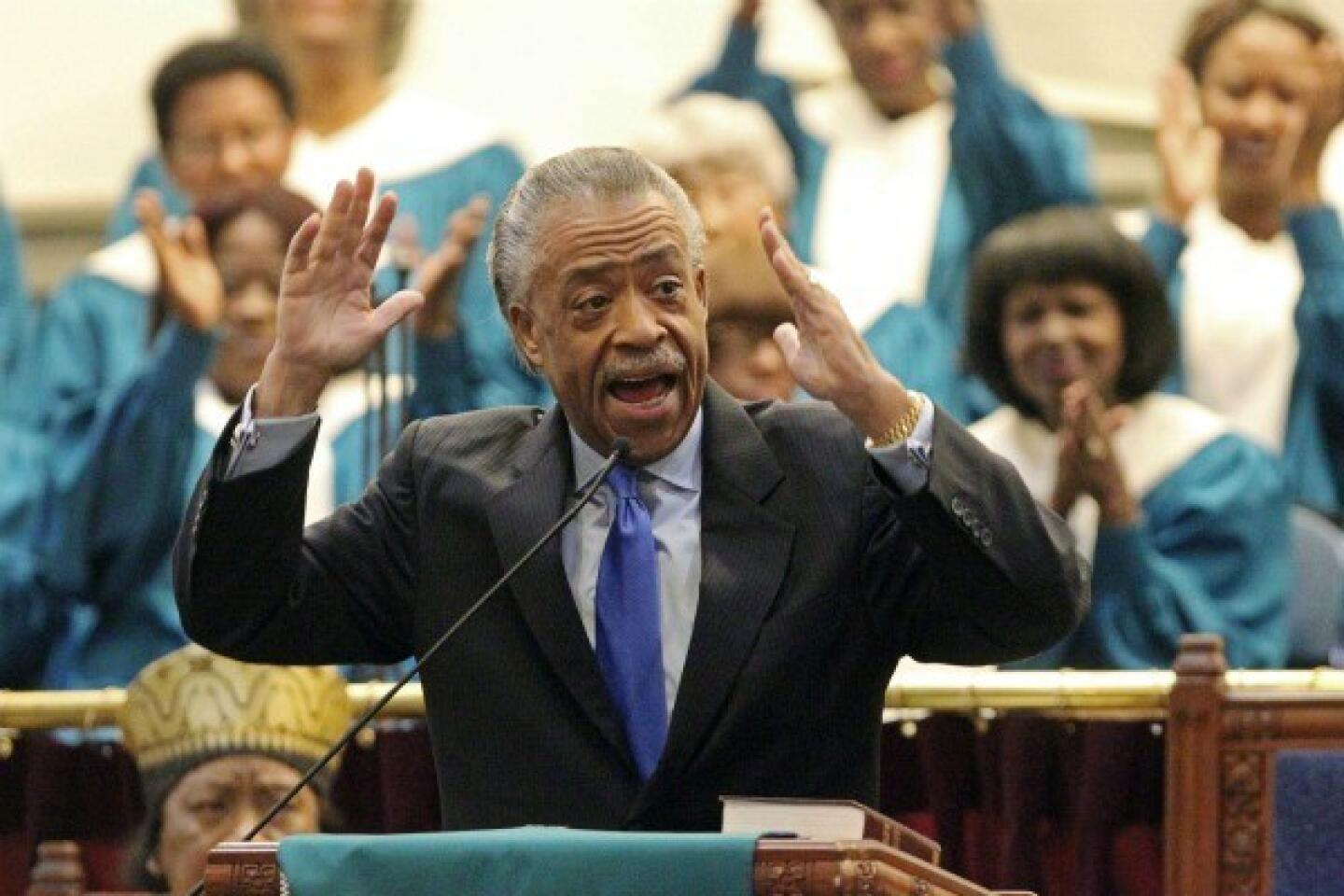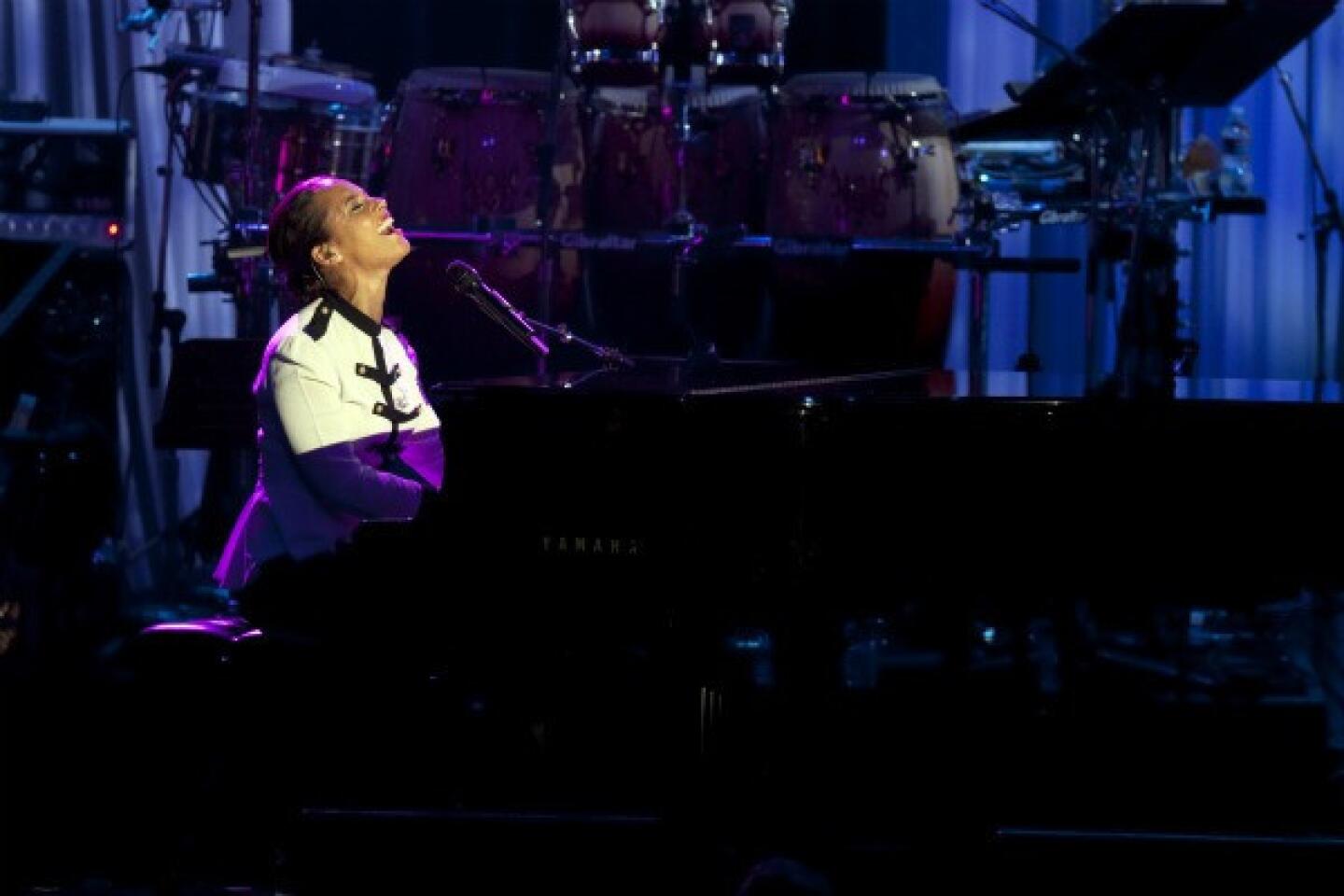In death, Whitney Houston’s years of struggle resonate with public
- Share via
In the hours immediately following the announcement of Whitney Houston’s death, social media exploded in a frenzy of testimonials, declarations of undying love and boundless grief, and — predictably — a small but steadfast stream of crude, even cruel, jokes. Suffocating sentimentality and barbaric unfeelingness are, after all, flip sides of the same coin of grandstanding emotionalism.
Celebrities took to Twitter to express shock and condolences. On Facebook among the general public, there was a race to post the most obscure YouTube clip and a seeming competition over who could put up the most heart-wrenching status update. There was lots of genuine, palpable love in the mix, but there was also lots of cloying posturing. Both are still in motion.
What the two tacks have in common is the rehabilitation of an icon. A woman who’d been largely reduced to a pop culture punch line was suddenly America’s sweetheart again, fallen but much beloved. Her artistry (and a dazzling growth spurt in that artistry, just before everything collapsed) was acknowledged and celebrated in ways it hadn’t been in more than a decade. Compassion that had been in short supply as she publicly struggled with addiction suddenly flowed thickly.
PHOTOS: Whitney Houston memorials and tributes
Some measure of hypocrisy is obviously at play. But that’s not all.
Ever since Princess Diana’s death, the media have turned every celebrity passing — from D-listers to the truly iconic — into a frenzy of over-amped, manipulated emotion. The apparatus for 24-hour melodramatic coverage was never dismantled. It’s jump-started with that invitation to testimony that is passed down from the assassination of President Kennedy: Where were you when it happened / when you heard? We’re then plugged into public performances of grief — grief that cycles back into itself, that feeds off and then into itself, growing exponentially.
But that’s only part of the dynamic. The other is that her death has at least temporarily muffled (not wholly silenced) the wisecracks and snickers that blanketed her accomplishments. It’s allowing for evaluations not filtered through snark.
FULL COVERAGE: Whitney Houston | 1963-2012
I have to admit, I was never a huge Houston fan. I knew the vast political and cultural meanings she had for black women and girls who were, and still are, jonesing for powerful, positive images in the media. But she was also a global icon who strummed something in people across racial and cultural divides.
I appreciated the sheer force and majesty of her voice, and the fact that she was in a rare, elite club of technically flawless singers. Her complete rebooting of what it meant to be a pop or soul singer reverberated around the globe.
But it wasn’t until 1998’s “My Love Is Your Love” CD that I really fell under her sway. It’s a glorious collection, save one or two sap fests. Houston’s voice is sensuous and gritty, fueled by her masterful command of it. She still has her staggering vocal power, but it’s now textured with subtext and new shading. From throaty growls to shiver-inducing trills, she does the most soulful singing of her career. Part of the thrill of listening to it is that it’s the sound of a peerless singer luxuriating in her own gifts, but without the joyless narcissism of, say, Christina Aguilera.
My heart fully opened to her during her much-hyped appearance on “Good Morning America” in September 2009, the year of her ill-fated, ill-advised comeback. She was doing a free concert before hundreds of fans to promote her then new CD “I Look to You.”
She was fit and beautiful, bounding across the stage with a cool, appealing looseness that wasn’t there in her early years. The performance itself was just OK. It quickly became clear that her voice was severely diminished, and her backup singers did most of the heavy lifting.
But just before she took the stage, there was a split second when the camera caught her face — before she put on her game face and turned on the magnetism — and her expression was inscrutable. I couldn’t help but wonder what was going through her mind. And as she performed song after song, her voice weakening with each one, and with it becoming more and more clear what had been lost, I was incredibly moved for her.
She was undertaking the everyday Herculean task so many of us must perform when the reality sets in that we have squandered our own talents, that we have been the ones to hamstring our own potential and irreparably harm ourselves, no matter what demons may also have been driving us. And we must still somehow get up, get dressed and carry on.
Whitney Houston’s talent was real, singular and undeniable, though she spawned an insufferable artistic progeny and a lamentable template (See: “American Idol”). But she was also very much a media creation, someone who had been fed to the machine in a Faustian bargain for fame (hers) and fortune (hers and many, many others.) And when she stumbled, that same machine fed on her, turning a woman who was in transparent free-fall into an easy joke.
It also has to be said, however, that in stripping away the gloss, in exploiting her to the hilt, there was also a way in which she was briefly semi-liberated by the machine.
The Bravo network’s reality show “Being Bobby Brown” was undoubtedly exploitative; the folks at the network must have rubbed their hands in glee when Brown actually gave them access to the unsanitized inner world of one of the world’s foremost divas. The thing is, as much as some fans cringed at the unvarnished depiction of Whitney, her earthy humor and no-nonsense attitude also endeared her to many. It was clear that the woman being shown wasn’t who Brown had turned her into but was something closer to the real thing. And there was something grittily appealing about that gritty woman. You pulled for her to make it.
The pathological obsession this country has with some woman being America’s princess, with the demand that she be pure, wholesome and beyond reproach is not only sexist garbage, but a function of the ongoing delusions about this country’s own wholesomeness and purity.
Houston, with her complicated subtext, unexamined back stories, struggles with addiction, and trouble striking the balance between her fictional, bankable self and more complex reality is, perhaps, a perfect emblem of this country.
We’re a culture of addicts fleeing our own lives for alternate realities, for the momentary comfort of distraction — through drugs, through the crappy food we eat too much of, through reality TV and tabloid journalism we ingest too much of, through whatever state-of-the-art gadget stays glued to our hands.
The entangled struggles for success (economic, material, artistic, whatever) and self-possession (how to define and fully own one’s self) are part and parcel of what it means to be a black American. What that all looks like is complicated, even controversial as it manifests in individuals who may or may not conform to what the world thinks they — as a black woman, as a black person, period — should look and sound like.
Houston resonated for so many because she seemed to be so far ahead of that battle. The fact of her sitting at the winner’s table, even with all the gifts and breaks with which she’d been blessed, is far from easy to achieve. Her doing so spoke to people across race, gender, class, what have you.
And maybe that is what is fueling some of the grief. Not just lament for her fall, but recognition of her struggles and her inability to master them.
Whitney Houston funeral
Where: New Hope Baptist Church in Newark, N.J.
When: 9 a.m. Saturday
TV coverage: CNN, BET, E!, MSNBC, HLN, Bounce TV
Online coverage: latimes.com
FULL COVERAGE: Whitney Houston | 1963-2012
More to Read
The biggest entertainment stories
Get our big stories about Hollywood, film, television, music, arts, culture and more right in your inbox as soon as they publish.
You may occasionally receive promotional content from the Los Angeles Times.

